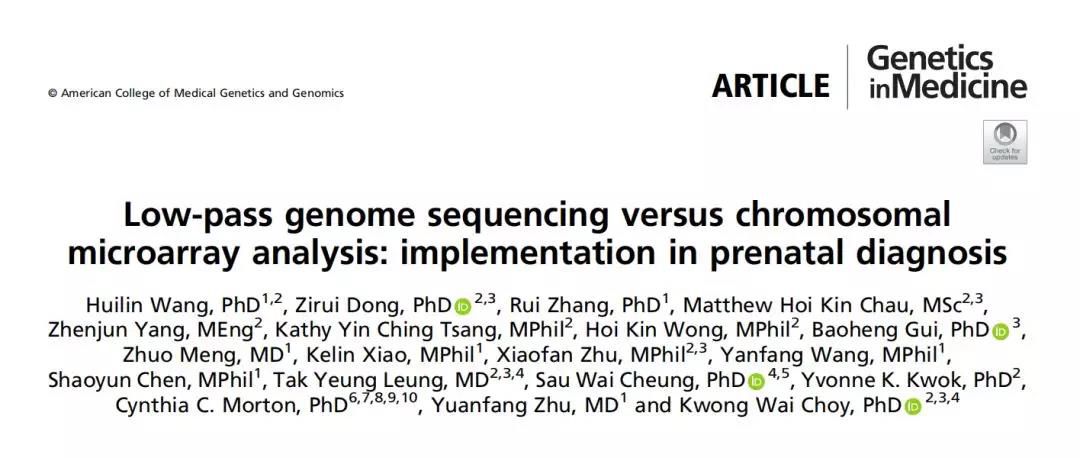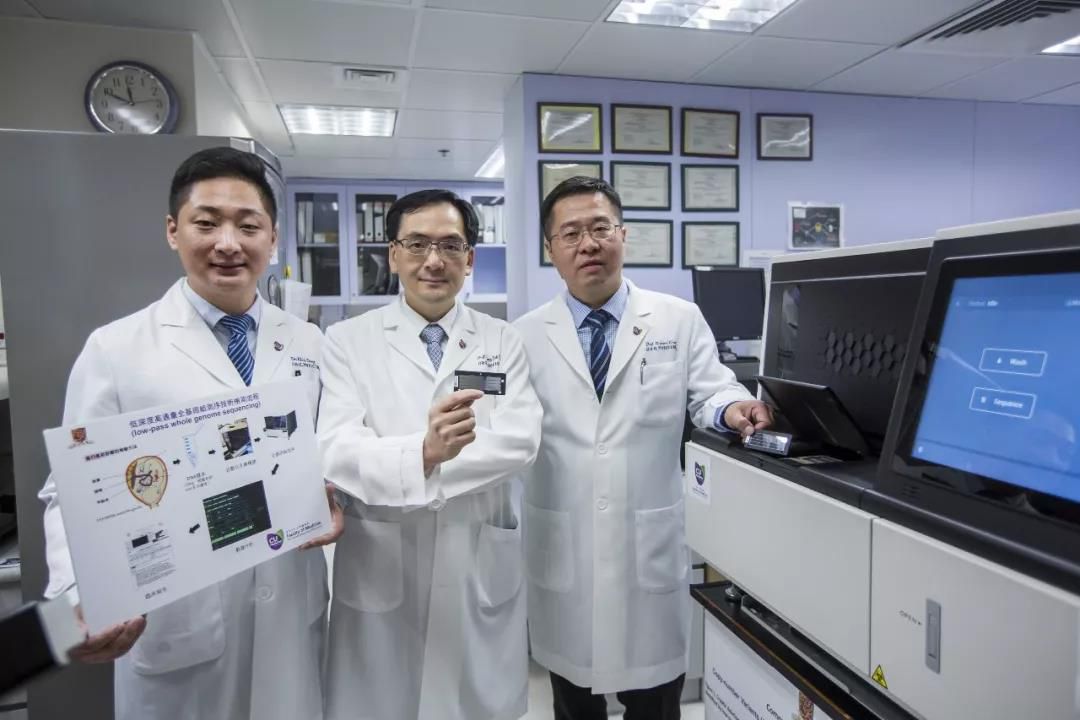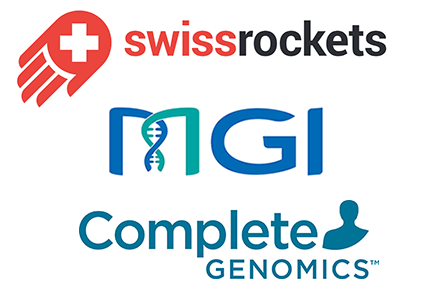Fetal chromosome karyotype analysis is often used in prenatal examination of high-risk pregnancy. With the development of technology, the application of chromosomal microarray analysis (CMA) in prenatal diagnosis has gradually advanced, and it has become a detection of high-risk pregnancy medium- and micro-level chromosome structural variation front-line technology. High-depth whole genome sequencing (WGS) can provide a comprehensive view of the entire genome and is a high-throughput detection of single nucleotide mutations and insertions / deletion, copy number variation and genomic structural reorganization.
But at present, highly in-depth WGS is expensive and has a lot of variation information, which makes it difficult to be widely used in prenatal diagnosis. Based on the level of low-depth WGS, it can reduce the sequencing cost of each sample while improving detecting throughput to achieve low-pass and high-throughput (low-pass WGS) What about more precise information?
Recently, an article published by the Department of Obstetrics and Gynecology of the Chinese University of Hong Kong School of Medicine in Genetics in Medicine, an international authoritative academic journal of medical genetics, compared low-depth, high-throughput whole-genome sequencing and chromosome microarray analysis. Low-depth whole-genome sequencing is used in prenatal diagnosis to provide more meaningful clinical information.

Figure: Related research results were published in the journal Genetics in Medicine.
Image source: Genetics in Medicine
Background | Traditional invasive prenatal diagnostic techniques and their limitations
Clinically, if a pregnant woman has experienced a miscarriage, or if an abnormality in the fetus is detected during an ultrasound or a Down's syndrome screening test is positive, the doctor will recommend that they undergo an invasive prenatal examination to diagnose whether the fetus has a genetic disease. Fetal chromosome karyotype analysis uses a microscope to observe the structure of the chromosome. About two-thirds of the fetus's karyotype report will be normal, but at least one of the fetuses will have structural abnormalities or developmental delays, which is related to various syndromes or genetic diseases. Professor Liang Deyang, head of the Department of Obstetrics and Gynecology at the Chinese University of Hong Kong School of Medicine, said: "If we can find out that the fetus has a clinically significant genomic imbalance in the prenatal diagnosis, we can provide more opportunities for pregnant women and their families. More information to help them make corresponding decisions and review their future fertility plans. Many syndromes or genetic diseases are actually related to abnormalities in the microstructure of chromosomes, but traditional karyotype analysis is difficult to identify such subtle genetic abnormalities "3 In order to overcome the limitations of traditional karyotype technology, the Chinese University of Hong Kong Medical School in Asia in 2009 first introduced and applied gene chip technology in prenatal diagnosis, and used chromosomal microarray analysis to detect more than 100 known gene sequence deletions or duplications. The team of the Department of Obstetrics and Gynecology of the hospital also introduced a comprehensive Genome sequencing technology to more accurately and comprehensively detect microdeletions or microduplications in genes and find more subtle pathogenic variations.

Figure: The Department of Obstetrics and Gynecology, The Chinese University of Hong Kong Medical School has successfully introduced a new whole-genome sequencing technology. (From the right) Prof. Cai Guangwei, Associate Professor of the Department of Obstetrics and Gynecology, The Chinese University of Hong Kong Medical School, Dr. Liang Deyang, Research Assistant and Dr. Dong Zirui, Research Assistant Professor. Photo Credit: The Chinese University of Hong Kong
Data | Low-Depth Whole Genome Sequencing vs Chromosome Microarray Analysis
Both microarray technology and whole-genome sequencing technology use villous biopsy cells, amniotic fluid, or fetal umbilical cord blood to measure copy number variations in DNA sequences to detect fetal genomic abnormalities. DNA copy number refers to a copy of a gene or part of a genome. The number of duplicates or omissions. These differences in DNA copy numbers make each person different, but some DNA copy number abnormalities can cause certain diseases. In order to compare low-depth whole-genome sequencing (low-pass GS) and chromosome microarray analysis (CMA), the experimental team enrolled 1023 pregnant women between the end of 2016 and the beginning of 2019, and performed the above two tests at the same time. In all samples, CMA detected 87 cases of aneuploidy and 37 cases were pathogenic or likely Pathogenic chromosome copy number variation, a total of 121 cases of abnormalities (the two chromosome abnormalities partially overlap); and low-pass GS not only detected all the chromosome abnormalities reported by CMA, but also detected 17 additional aneuploidies or chromosomal copy number variation that is pathogenic / probable. Based on chromosome microarray analysis, low-depth whole-genome sequencing achieved a sensitivity of 99.9% (121/121) and 87.7%Specificity (121/138), the overall positive diagnosis rate was 13.5% (138/1023).
On the other hand, the requirements of different technologies for the starting amount of DNA affect the difficulty of clinical application. The experimental team carried out sample preparation according to the standard of starting CMA 300ng DNA and low-pass GS starting 50ng. According to the two technologies According to clinical quality control standards, 5 of the low-depth whole-genome sequencing samples failed the initial experiment, and 47 cases of chromosomal microarray analysis, and the repeated experiment rates of the two technologies were 0.5% (5/1023) and 4.6%, respectively. (47/1023), indicating that low-depth whole-genome sequencing has lower sample requirements for prenatal diagnosis and more stable experiments. Application | New technology can detect more clinically significant genomes and low-depth whole-genome sequencing of chromosomal abnormalities The comparison with chromosomal microarray analysis shows the great potential of the former for clinical prenatal diagnosis. Thanks to the effective control of sequencing depth, this technology has a broader and brighter future today, as the price of sequencing continues to decrease. Cai Guangwei, an associate professor in the Department of Obstetrics and Gynecology at the Chinese University of Hong Kong School of Medicine, said: "Whole genome sequencing is an advanced sequencing method that can provide whole genome sequence information.
Over the past five years, our team has successfully developed whole-genome DNA copy number analysis (named FetalSeq) by using low-depth, high-throughput whole-genome sequencing methods, and the number of samples that can be detected in a single run is also larger (48 samples). It proves that it can provide additional and more accurate genetic information for prenatal diagnosis than gene chip technology. "3 Talking about the clinical significance of low-depth whole-genome sequencing technology, Dong Zirui, research assistant professor of the Department of Obstetrics and Gynecology, The Chinese University of Hong Kong School of Medicine According to the PhD: "By analyzing the entire genome, the FetalSeq fetal sequencing platform can help identify chromosomal diseases, pathogenic DNA copy number variations, or single-gene disorders such as Duchenne muscular dystrophy. This technology can provide more opportunities for pregnant women and their families. Accurate fetal diagnosis for future health management. "3 The Department of Obstetrics and Gynaecology, The Chinese University of Hong Kong School of Medicine is one of the leading teams for prenatal genetic diagnosis in Hong Kong.
Since the introduction of gene chip technology analysis in 2009 to identify abnormal chromosome numbers (such as Down's syndrome) and microdeletion or duplication syndrome, its team has been committed to providing related services and research to match the growing demand for invasive genetic testing. Starting from June 2019, the Hong Kong Hospital Authority provides free gene chip technology analysis to all high-risk pregnant women in Hong Kong. Recently, another study published by the Chinese University of Hong Kong uses gene chip technology to analyze DNA copies with significant clinical significance in prenatal diagnosis. It is proved that pathogenic genetic aberrations occur in 1 out of 64 pregnancy cases with invasive genetic diagnosis. 4 It is believed that in the future, low-depth whole-genome sequencing will have more room for development in the clinical field. The clinic provides more accurate and credible genetic information and makes a more prominent contribution to human health.
In recent years, the application prospects of low-depth whole-genome sequencing technology have gradually been confirmed by clinical practical cases. This research was completed based on the MGI MGISEQ-2000 sequencing platform. It is reported that MGISEQ-2000 is the main model of MGI’s sequencer. The data output of a single machine reaches 75-1440gb, supports a variety of read lengths, and it takes only 38 hours at full speed for full load pe150.It supports applications in scientific research, clinical medicine, justice, agriculture, etc. The data output has the advantages of high accuracy, low repetitive sequence rate, and low label jumps (Remark: DNBSEQ-G400 and DNBSEQ-G50 remain their original product names as MGISEQ-2000 and MGISEQ-200 respectively in China and some other overseas countries.)



 Sequencer Products: SEQ ALL
Sequencer Products: SEQ ALL















 Technologies
Technologies Applications
Applications Online Resources
Online Resources Data Bulletins
Data Bulletins Service & Support
Service & Support Global Programs
Global Programs Introduction
Introduction Newsroom
Newsroom Doing Business With Us
Doing Business With Us Creative Club
Creative Club













